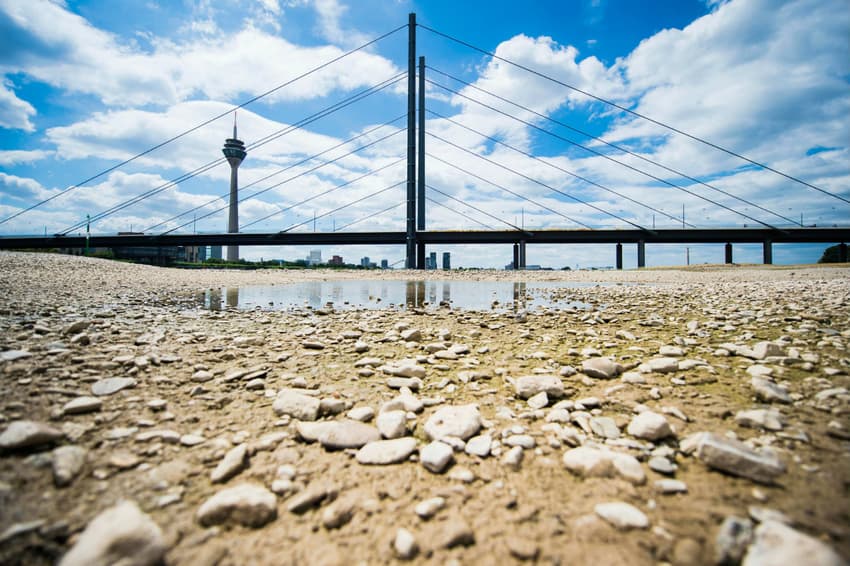Fires and drought pose risks in North-Rhine Westphalia

Forest and field fires have broke out in several parts of North-Rhine Westphalia (NRW) over the past few days, threatening vegetation and wildlife.
While the German Weather Service (DWD) said on Wednesday that the fire risk is now decreasing, the state still has issued the second highest possible fire warning through the weekend, and continues to grapple with drought.
“It has rained a little bit but it has only been a drop in the bucket,” Friedrich Louen from Fire and Wood NRW told the Rheinische Post.
The number of days with temperatures reaching 25 degrees or more in NRW, the most populous state in Germany, has been over the yearly average.
On Monday and Tuesday, several fires broke out throughout the state, including a large field fire along the autobahn between the towns of Erkelenz and Hückelhoven near the Dutch border that led to parts of the road being temporarily closed off due to the smoke.
A larger fire broke out by Haltern am See near Münster on Monday, affecting around 10,000 square metres of forest grounds and wheat fields. The city of Moers near Duisburg banned barbecues in parks, after two minor fires also started in a meadow.
Even in areas not yet affected by fire, drought is harming the vegetation, according to Louen. Younger trees have roots which often run 20 centimetres deep and dry out quickly.
The dry summer weather is also threatening the fish in NRW. "We must reckon with a visible death of fish,” Olaf Niepagenkemper from the North Rhine-Westphalian Fisheries Association told the Rheinische Post. “The situation is dramatic. And it could get even worse if it stays so warm.”
The persistently high temperatures are heating up the waters, leading oxygen levels in lakes to decrease and threatening fish.
"Waters bordering on agricultural land are particularly affected," said Niepagenkemper. "Manure is also repeatedly discharged into the lakes, which leads to a further decrease in oxygen."
Comments
See Also
While the German Weather Service (DWD) said on Wednesday that the fire risk is now decreasing, the state still has issued the second highest possible fire warning through the weekend, and continues to grapple with drought.
“It has rained a little bit but it has only been a drop in the bucket,” Friedrich Louen from Fire and Wood NRW told the Rheinische Post.
The number of days with temperatures reaching 25 degrees or more in NRW, the most populous state in Germany, has been over the yearly average.
On Monday and Tuesday, several fires broke out throughout the state, including a large field fire along the autobahn between the towns of Erkelenz and Hückelhoven near the Dutch border that led to parts of the road being temporarily closed off due to the smoke.
A larger fire broke out by Haltern am See near Münster on Monday, affecting around 10,000 square metres of forest grounds and wheat fields. The city of Moers near Duisburg banned barbecues in parks, after two minor fires also started in a meadow.
Even in areas not yet affected by fire, drought is harming the vegetation, according to Louen. Younger trees have roots which often run 20 centimetres deep and dry out quickly.
The dry summer weather is also threatening the fish in NRW. "We must reckon with a visible death of fish,” Olaf Niepagenkemper from the North Rhine-Westphalian Fisheries Association told the Rheinische Post. “The situation is dramatic. And it could get even worse if it stays so warm.”
The persistently high temperatures are heating up the waters, leading oxygen levels in lakes to decrease and threatening fish.
"Waters bordering on agricultural land are particularly affected," said Niepagenkemper. "Manure is also repeatedly discharged into the lakes, which leads to a further decrease in oxygen."
Join the conversation in our comments section below. Share your own views and experience and if you have a question or suggestion for our journalists then email us at [email protected].
Please keep comments civil, constructive and on topic – and make sure to read our terms of use before getting involved.
Please log in here to leave a comment.